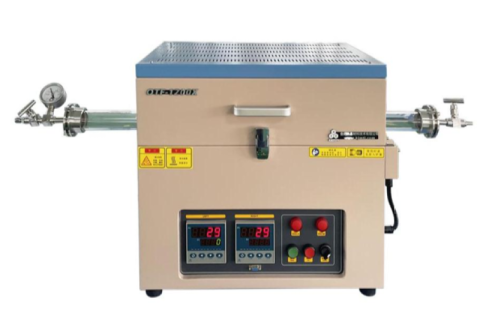
News
From November 7th to 9th, 2025, the 5th Youth Academic Conference on Artificial Crystal Materials was held in Fuzhou, Fujian Province. The conference, themed "Frontier Exploration and Innovative Applications," focused on basic research, key technological breakthroughs, and industrial applications of artificial crystal materials. It attracted over 500 young scholars and experts from more than 100 universities and research institutes across China, including Tsinghua University, Peking University, institutes of the Chinese Academy of Sciences, University of Electronic Science and Technology of China, and Shandong University, as well as leading enterprises in the industry, to gather together and jointly outline a new blueprint for the future development of artificial crystal materials.
Mastering the standardized operation of the gas atmosphere control and valve operation of the three zone high temperature tube furnace is very important to ensure the safety of the equipment and the reliability of the experiment. In this article, I will combine the characteristics of the equipment to introduce you to the main precautions.
Working principle of dual heating zone tube furnace is not simple power-on heating, but through the coordination of heating system, temperature control system, atmosphere control system and structural adaptation design, the whole process management from temperature control to environmental protection is realized, and it provides a reliable high temperature environment for experiments and production.
The use of tube furnace is not limited to a single high-temperature heating, but revolves around material preparation, modification, and testing under precise temperature control, covering the whole process from laboratory small-batch research and development to industrial pilot testing, and providing stable and reliable heating environment support for technological breakthroughs in different fields.
On October 22, 2025, more than 30 teachers and students majoring in applied physics from the School of Science of Shenyang University of Technology, with curiosity and desire to explore the scientific research equipment industry, walked into Shenyang Kejing Auto-instrument Co., Ltd. and started a one-day production internship research activity.
The maximum operating temperature of open type vacuum tube furnace is 1200℃, and the maximum constant temperature gradient of the two temperature zones is 200℃. With high-purity quartz tubes and flanges, it can not only meet the temperature accuracy requirements of fine experiments, but also adapt to different batch sample processing scenarios. The application of open type vacuum tube furnace has deeply covered many fields such as new energy, semiconductor, ceramics, and scientific research in universities.
For B-end buyers in the fields of material research and development and semiconductor manufacturing, mastering the standardized operation of small vacuum tube furnace can ensure experimental safety, data repeatability and equipment life.
The working principle of plasma arc melting furnace is to ionize inert gas through a plasma generator to form a high-temperature plasma arc, and use the concentrated energy released by the plasma arc to achieve rapid melting and refining of refractory materials. Our SP-MSM20-9 small plasma arc melting furnace is optimized on the basis of this principle.
Dual heating zone split tube furnace divides the heating tube body into two independent heating areas, each area is equipped with a dedicated heating element and temperature control system, which realizes the precise operation of one zone and one control.
From October 9th to 12th, 2025, the 2025 China Biomaterials Conference and Exhibition of New Technologies, Products, and Instruments (CSBM 2025) concluded successfully at the Shaoxing International Convention and Exhibition Center in Zhejiang Province. The conference brought together over 3,000 experts, scholars, physicians, and entrepreneurs from domestic and international research institutions, medical institutions, businesses, and regulatory agencies to discuss cutting-edge technologies, innovative products, and future development directions in the fields of biomaterials and medical devices.










